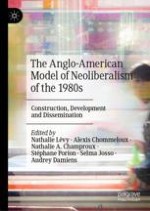2022 | OriginalPaper | Chapter
15. Expanding the Kingdom: The Walt Disney Company as a Purveyor of Neoliberal Logic
Author : Ilias Ben Mna
Published in: The Anglo-American Model of Neoliberalism of the 1980s
Publisher: Springer International Publishing
Activate our intelligent search to find suitable subject content or patents.
Select sections of text to find matching patents with Artificial Intelligence. powered by
Select sections of text to find additional relevant content using AI-assisted search. powered by
